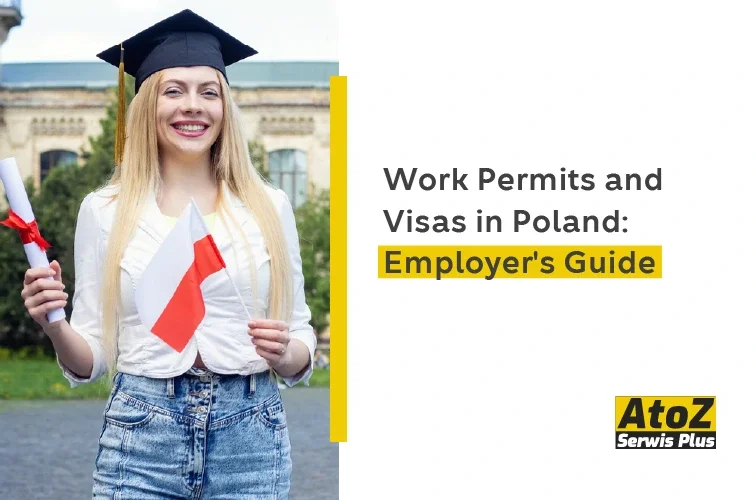

Work Permits and Visas in Poland: Employer's Guide
Poland’s strategic location and robust economy make it a prime destination for foreign workers. However, hiring international employees requires employers to navigate work permits, visas, and compliance regulations. This guide covers all the key aspects employers need to know.
1. Importance of Immigration Compliance in Poland
Employers hiring foreign workers in Poland must ensure compliance with the country’s strict immigration laws. Failure to do so can lead to:
- Fines: Penalties ranging from PLN 1,000 to PLN 30,000 (€220 to €6,500).
- Operational Restrictions: Suspension of business licenses or permits.
- Reputational Damage: Negative impacts on partnerships and recruitment efforts.
Additionally, compliance ensures a lawful working environment, safeguarding the employer and the employee.
2. Who Is Eligible to Work in Poland?
EU/EEA/Swiss Citizens
Due to their free movement rights within the EU, these individuals can work in Poland without a work permit. They only need to register for residence if they stay more than 90 days.
Non-EU/EEA Nationals
Most non-EU nationals require a work permit, but there are exceptions:
- Holders of permanent residence permits or EU long-term residence permits.
- Graduates from Polish universities seeking employment post-study.
- Individuals granted asylum or subsidiary protection.
- Dependents of EU citizens residing in Poland.
Ukrainian Citizens
Special provisions under Poland’s crisis measures allow Ukrainian nationals to work without permits if they meet specific criteria.
3. Do Non-Citizens Need a Work Visa or Work Permit in Poland?
- Work Permit: Required for non-EU nationals before starting employment.
- Visa: Required to enter and stay in Poland for work purposes legally.
Exemptions from work permits apply for internships, intra-corporate transfers, and specific bilateral agreements.
4. Eligibility Requirements for a Work Visa in Poland
Eligibility Criteria for Work Visa (Type D):
- Employment Contract: A signed agreement specifying the role, salary, and duration of employment.
- Valid Work Permit: Employers must obtain this from the Voivodeship Office.
- Sufficient Funds: Evidence of financial resources to sustain living expenses.
- Travel Insurance: A valid policy covering up to €30,000 in medical costs.
- Accommodation Proof: Confirmed housing arrangements in Poland.
5. Long-Stay Visa Types in Poland
Poland offers various visa types for stays exceeding 90 days:
- Work Visa (Type D): Issued to foreign workers with valid work permits.
- Study Visa: For students enrolled in Polish universities.
- Family Reunification Visa: Family members joining EU/EEA or Polish citizens.
- Temporary Residence Permit: Covers employment, study, or other justifiable reasons for staying longer than one year.
Each visa type requires specific supporting documents.
6. How to Apply for a Work Permit in Poland
The process involves the employer taking the lead. Steps include:
- Labor Market Test (If Necessary): The local labour office assesses whether no suitable local candidates are available.
- Document Preparation:
- Application form.
- Job description and employment contract.
- Proof of company registration and tax compliance.
- Submission to Voivodeship Office: The employer submits the complete application.
- Processing Time: Permits are issued within 1 to 2 months.
Once approved, the work permit is valid only for the specified job and employer.
7. How to Get a Work Visa for Poland
To obtain a work visa, employees must follow these steps:
- Secure a Work Permit: Employers must provide this document.
- Apply at Polish Consulate:
- Completed visa application form.
- Passport valid for at least six months.
- Two recent passport-sized photographs.
- Travel insurance policy.
- Work permit and employment contract.
- Visa Fee Payment: Fees range from €60 to €100, depending on nationality.
- Processing Time: Visa decisions are typically made within 15 days but can take up to 60 days.
8. Employee Work Visa Sponsorship Process
Employers must take the following steps:
- Obtain Work Permit: Initiate the permit process with local authorities.
- Provide Visa Support Documents:
- Invitation letter.
- Accommodation arrangements.
- Employment details.
- Track Visa Application: Assist the employee during processing.
- Comply with Legal Obligations: Ensure the employee’s role aligns with the work permit terms.
Employers can engage immigration specialists to simplify the sponsorship process.
9. Visa Requirements for Digital Nomads in Poland
Poland does not yet have a dedicated digital nomad visa. Remote workers typically:
- Enter on a tourist visa (Schengen Type C) for short stays.
- Explore options like the National Visa (Type D) for extended stays.
Employers hiring remote workers must ensure compliance with tax and employment laws.
10. Key Challenges in Work Permit and Visa Processes
- Language Barrier: Most documents must be submitted in Polish.
- Processing Delays: Work permits and visas can take months.
- Changing Regulations: Frequent updates to immigration policies.
To mitigate these challenges, employers should consult legal experts or immigration agencies.
Polish Government Resources for Employers
- Polish Office for Foreigners
- Ministry of Family and Social Policy
- EU Your Europe - Working in Poland
These resources provide updated regulations, forms, and guidance on hiring foreign employees.
Frequently Asked Questions
Q1: Can an employee work in Poland while waiting for their work visa?
Foreign workers must have a valid visa and work permit before starting employment.
Q2: How long is a work permit valid in Poland?
Work permits are valid for up to three years and can be renewed.
Q3: Are there any special visa programs for skilled workers?
Yes, programs like the EU Blue Card facilitate entry for highly skilled workers.
Q4: What happens if an employee changes employers?
A new work permit must be obtained since permits are employer-specific.
Conclusion
Poland’s structured immigration system ensures the lawful employment of foreign workers. While the process can be complex, employers can streamline it by understanding legal requirements and leveraging government resources. By prioritising compliance, businesses can unlock global talent and thrive in Poland’s competitive market.





